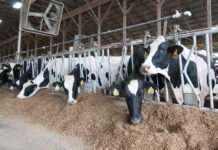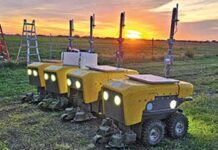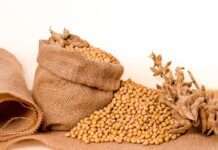Feed the Future Innovation Lab for Sustainable Intensification, based in Manhattan, Kansas, co-organizes inaugural conference focusing on food systems in Southeast Asia
MANHATTAN, Kan. — Solving the world’s big food and nutrition problems requires a wide range of scientists – agronomists, social scientists, economists, horticulturalists, soil scientists and more.
For that reason, 165 researchers from 16 countries converged on Phnom Penh, Cambodia, from Jan. 10-13 for the First International Sustainable Agricultural Intensification and Nutrition Conference, the first conference of its kind in Southeast Asia.
Presentation topics by researchers and students included farming systems, horticulture, livestock, soil health, nutrition, gender roles and youth engagement, among many others, with an overarching purpose of solving the everyday problems of millions of smallholder farmers around the globe.
The Royal University of Agriculture (RUA) in Phnom Penh, Cambodia, hosted the conference, which was organized by Kansas State University’s Feed the Future Innovation Lab for Collaborative Research on Sustainable Intensification (SIIL) in partnership with RUA’s Center for Excellence on Sustainable Agricultural Intensification and Nutrition (CE SAIN).
Cambodia is at a crossroads, said Sang Lee, keynote speaker and deputy director of the Food Security and Environment Office USAID/Cambodia. “The economy is developing quickly. There is rapid urbanization, and competition is increasing globally and from the region. For these reasons alone, it is critical to get the best minds in the world together to solve some of the Cambodian agriculture sector’s most critical problems.”
The CE SAIN was established by K-State’s SIIL through funding from United States Agency for International Development (USAID) in Cambodia as part of Feed the Future, the U.S. government’s global hunger and food security initiative.
“It is important to modernize and transform Cambodia’s agriculture on a sound basis of science and evidence,” Lee said. “That transformation starts here at RUA.”
The projects featured at the conference take a holistic, systems approach to the variety of factors that affect farmers’ ability to produce a stable food supply over a long period of time.
“A systems approach helps us to methodically diagnose and solve critical problems of farmers by enhancing overall farm productivity, income, nutrition and standards of living,”
said Vara Prasad, Kansas State University Distinguished Professor and director of the SIIL.
“This approach helps improve our understanding of broader impacts, barriers to adoption and our ability to improve food security, nutrition needs and resilience of smallholder farmers.”
Successful farming is not just about planting annual grain crops, but also includes livestock, vegetables, fruits, perennial crops, legumes and fish, among others. It also means efficiently using and recycling all available resources and protecting the environment.
“Improving diversity in farming systems is key for enhancing resilience,” Prasad said.
Some of the innovations highlighted at the conference included use of conservation agricultural practices and drip irrigation systems in vegetable gardens, perennial vegetable crops, cover crops, integrated pest management practices, mechanical tools for planting and harvesting, biogas production, a device for cooking with solar energy and more.
“The conference was a showcase for sustainable intensification and also a fantastic professional development opportunity for the students supported by CE SAIN and SIIL,” said Gary Pierzynski, Kansas State University Distinguished Professor and head of the Department of Agronomy. “The students were able to learn more about sustainable intensification and practice their presentation skills.”
The conference began with a welcome speech from Veena Reddy, acting mission director of USAID/Cambodia, followed by opening remarks from Om Kimsear, undersecretary of state of the Ministry of Agriculture Forestry and Fisheries. Other keynote speakers included Visalsok Touch, Cambodia’s undersecretary of state of the Ministry of Education, Youth and Sports, and Jerry Glover, senior sustainable agricultural systems adviser, USAID in Washington, D.C.
Attendees visited the CE SAIN technology park in Phnom Penh, a demonstration farm operated collaboratively with the Royal University of Agriculture to conduct research and showcase promising practices for Cambodian farmers.
Participants also traveled through Cambodian provinces to see smallholder farming techniques at other technology parks in Kampong Cham, Kampong Thom and Siem Reap. They toured a technology park at Ramsey Sophanna High School and judged a student agriculture competition, an event created to spur interest in agricultural studies among youth and children.
“Attendees also visited 12 farmers who were using novel technologies in three villages and judged a competition created by the CE SAIN to help motivate farmers to adopt new technologies in a diversified farming model,” said Manny Reyes, research professor at K-State and coordinator of activities in Cambodia.
“I am pleased to see active participation from farmers, scientists, students, youth, policy makers and representatives from the government and private sector as well as national and international organizations in the conference and field visits,” Prasad said.
Lyda Hok, director of the CE SAIN, said, “Collaboration and knowledge-sharing among all stakeholders and linking innovators, practitioners and policy makers is key to addressing food and nutritional security in Cambodia and other developing countries.”
To learn more about the SIIL, visit www.k-state.edu/siil/ and follow the lab on social media:
· Twitter: @SIIL_KSU
· Facebook: /SIILKSU
· Instagram: @SIIL_KSU



